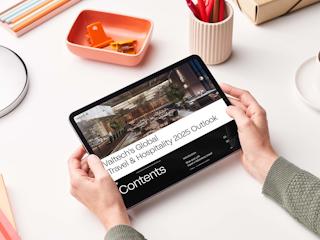This is the first in our monthly series of blog posts exploring the future of travel. Each article will focus on a different stage of the journey — from discovery to destination — to uncover the technologies, behaviors and business shifts redefining the industry.
Why Dreaming? Firstly, we are in a period of technological advancement with so much potential and yet so many unknowns that it can be hard to determine what the real potential is. And secondly, as a travel industry, we facilitate dreams, both in the planning process and in the travel experience itself. This cannot be lost as new technologies offer the potential to create frictionless booking a reality.
Where travel dreams begin are changing
The advent of AI-driven answer engines is fundamentally reshaping how travel brands engage with consumers, challenging established models of visibility and raising critical questions about the future dominance of online travel agencies (OTAs) and whether Google or ChatGPT will become the ultimate gatekeepers of user intent. This shift necessitates a re-evaluation of traditional marketing strategies, moving from mere visibility to intelligent experience optimization.
In the era of AI-driven search, simply ranking at the top of traditional search results will no longer guarantee clicks or conversions. AI overviews, which directly answer user queries on the search engine results page (SERP), have been correlated with a 34.5% lower average click-through rate (CTR) for the top-ranking page compared to similar keywords without an AI overview. This indicates a move towards "zero-click searches," where a user's query is resolved directly within the AI summary, similar to featured snippets. We’ve also seen user behavior change, going from an average of four words for a traditional search to 23 words in a conversational query.
For brands, this means a critical transition from traditional search engine optimization (SEO) to Answer Engine Optimization (AEO). Visibility now depends on how content is surfaced within AI summaries and conversational interfaces, rather than just raw organic rankings. To remain visible, companies must:
- Optimize for AI crawlers and generators: Ensure sites are structured and content is prepared for analysis by AI, as these systems are increasingly used regardless of whether they are clicked on. Documentation, in particular, has become key for AI to analyze information effectively.
- Focus on context and consistency: For a brand to be referenced in AI citations, there needs to be frequent and consistent mention of the brand name alongside the topics it is targeting across the internet. Maintain a tightly defined brand identity across the entire experience, including generative AI outputs, to ensure consistency and defend against fraud.
- Embrace multimodal and conversational interfaces: As search moves beyond keywords to natural language conversations, brands need to prepare for multimodal queries that combine voice, images and text. The goal is for AI to understand nuanced preferences and respond dynamically.
- Prioritize trust and transparency: Given consumer hesitancy to fully trust AI, especially with sensitive information, transparency in action logs and reasoning and robust data security are crucial for building confidence.
OTAs: Struggling to retain dominance or adapting to a new reality?
Many travel companies currently depend on OTAs but would very much like the rise of agentic search to reset the balance of power. This presents a complex challenge for OTAs, but they are well-positioned to adapt.
According to Ad Age, Booking Holdings' (owners of Booking.com) total worldwide marketing expenses were $6.8 billion in 2023 with 70% of this reportedly spent directly with Google. It is no wonder then that Google — having not yet found a revenue replacement for paid search — is now testing paid listings and shopping ads in AI overviews.
OTAs currently hold a significant share of hotel bookings, and their existing scale and vast amounts of structured data are a considerable advantage in the AI era. Specialized vendors, including OTAs, are absorbing AI faster by embedding copilots, automating workflows and fine-tuning models on their proprietary industry data.
So, whilst the technology exists within Google and ChatGPT to change the balance of power in discovery, it seems likely that the status quo will be maintained. However, the same technologies could be applied to turn more travel brands into OTAs. Consider airlines which are actively adding holiday services, ancillaries and experiences — this could present a scaled threat to OTA dominance.
The final say may still come down to the consumer: more of us are starting holiday purchases by booking an experience first, not a flight or a room. This may create a shift in who can best serve needs and who wins the visibility battle.
Google vs. ChatGPT: The battle for the gatekeepers of user intent
The competition to control user intent is largely a battle between established search giants and rapidly growing AI platforms.
Google is "all-in" on conversational AI, integrating generative AI into search to provide more elaborate answers, but it has been forced to respond to the challenge laid down by ChatGPT. ChatGPT experienced unprecedented growth in user adoption, reaching 800 million weekly active users by April 2025 — a figure Google took 11 years to achieve. It represents a shift from command-based searches to natural language conversations, acting as a personal assistant that can engage in dialogues in over 100 languages.
Both are pursuing revenue integration through ads and shopping in their results and are becoming increasingly multimodal by incorporating images, videos and apps into responses. They are being woven into the places where we will ask questions — in your car, office, kitchen or when out running. This is a huge battleground: Google has a significant advantage given its integration into cars via Google Automotive Services (GAS), into homes via Google Home devices, TVs, Google Agentspace and the ubiquitous Android mobile OS (about 70% global market share). They want to own the interface, not just the app or the underlying infrastructure. This will shape the next generation of user behavior, as the web we’ve known for the last 30 years gradually gives way to conversational and multimodal experiences.
No wonder OpenAI partnered with Jony Ive to rethink how humans interact with technology. For OpenAI to unseat Google as the main interface will require a radical shift in human behaviour and product experience — something even more transformative than the iPhone.
The future points to an era where highly specialized agents speak to each other, creating a new layer of interoperability. Visa and Mastercard are already creating protocols for agent-to-agent shopping with virtual cards anchored to digital wallets. The more these are connected to our digital behaviour, the more accurate and effective shopping agents will become — an advantage for Google, though partnerships could allow Apple and OpenAI to compete closely.
If the past teaches us anything, scale matters. Google won previous battles against Altavista, AskJeeves, Excite and Yahoo; they look set to win this one too — provided their product experience evolves beyond purely functional solutions to better serve travellers’ discovery and booking needs.
The tension between AI travel agents and the human holiday ritual
AI has ushered in an era of ultra-convenience — booking a holiday could be as simple as saying, “Plan me something relaxing.” Increasingly, this is becoming a reality as AI travel agents such as MindTrip, GuideGeek and Layla promise to collapse hours of research, price comparison and itinerary planning into seconds of conversation. These tools can understand preferences, integrate real-time pricing and surface hyper-personalized recommendations, disrupting the tedious parts of travel booking.
For decades, digital experiences were built around hierarchies of pages and navigation trees. That model is breaking. Consumers now expect journeys that feel as seamless, personal and adaptive as conversations. Static pages can’t keep up.
The startup surge: Where AI travel agents are gaining ground
In recent years, dozens of startups have emerged with a shared promise: to remove the hassle from travel planning. Examples include:
- MindTrip, which blends conversational AI with booking engines to act as a digital travel concierge.
- Roam Around, instantly generating travel itineraries based on location and interest.
- Vacay, a browser-based AI assistant capable of full-service travel planning.
- GuideGeek, combining destination guides with LLMs for on-demand travel advice.
Taking us from traditional UX best practices for travel like this:
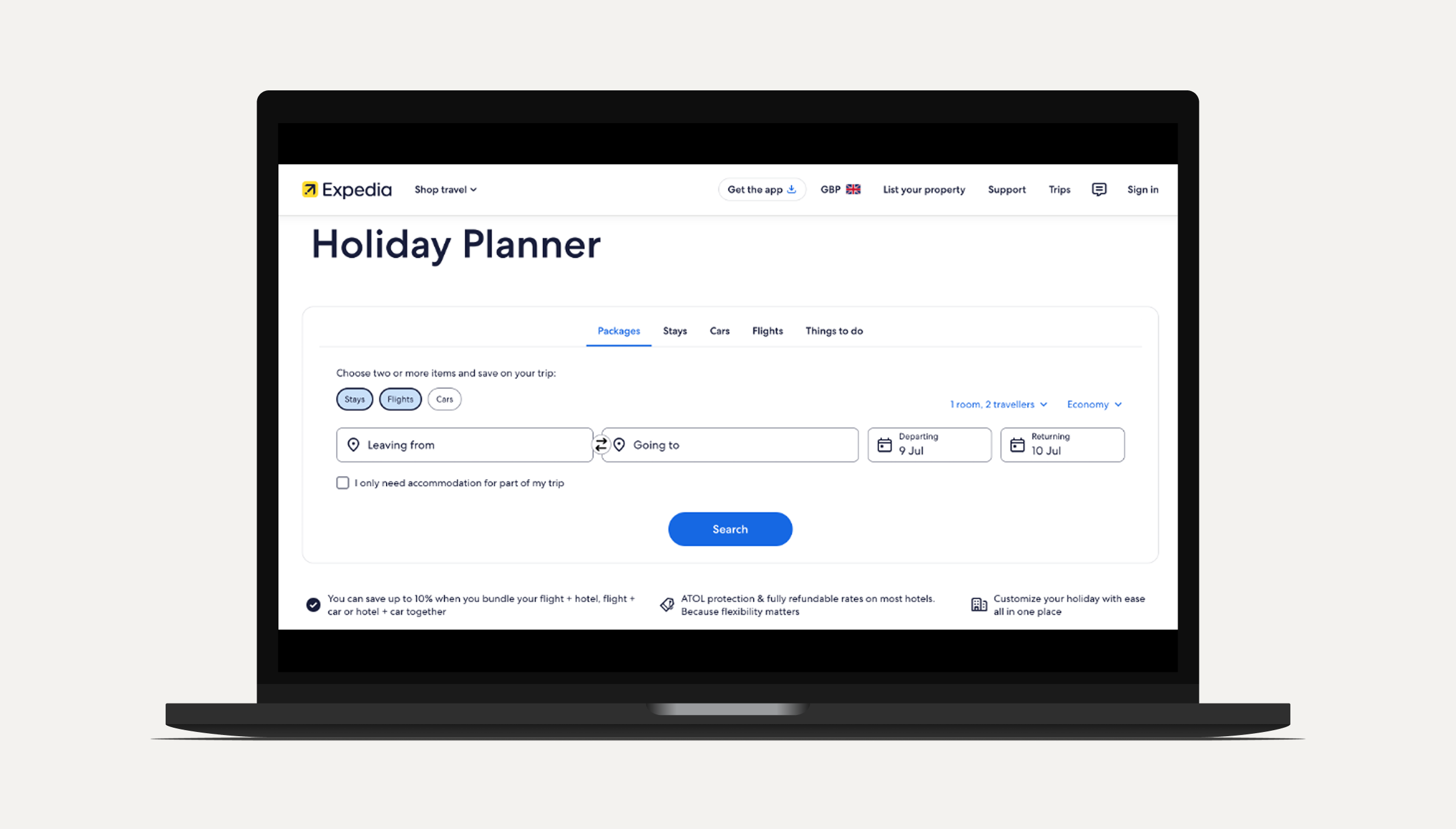
To new conversational planners like Layla
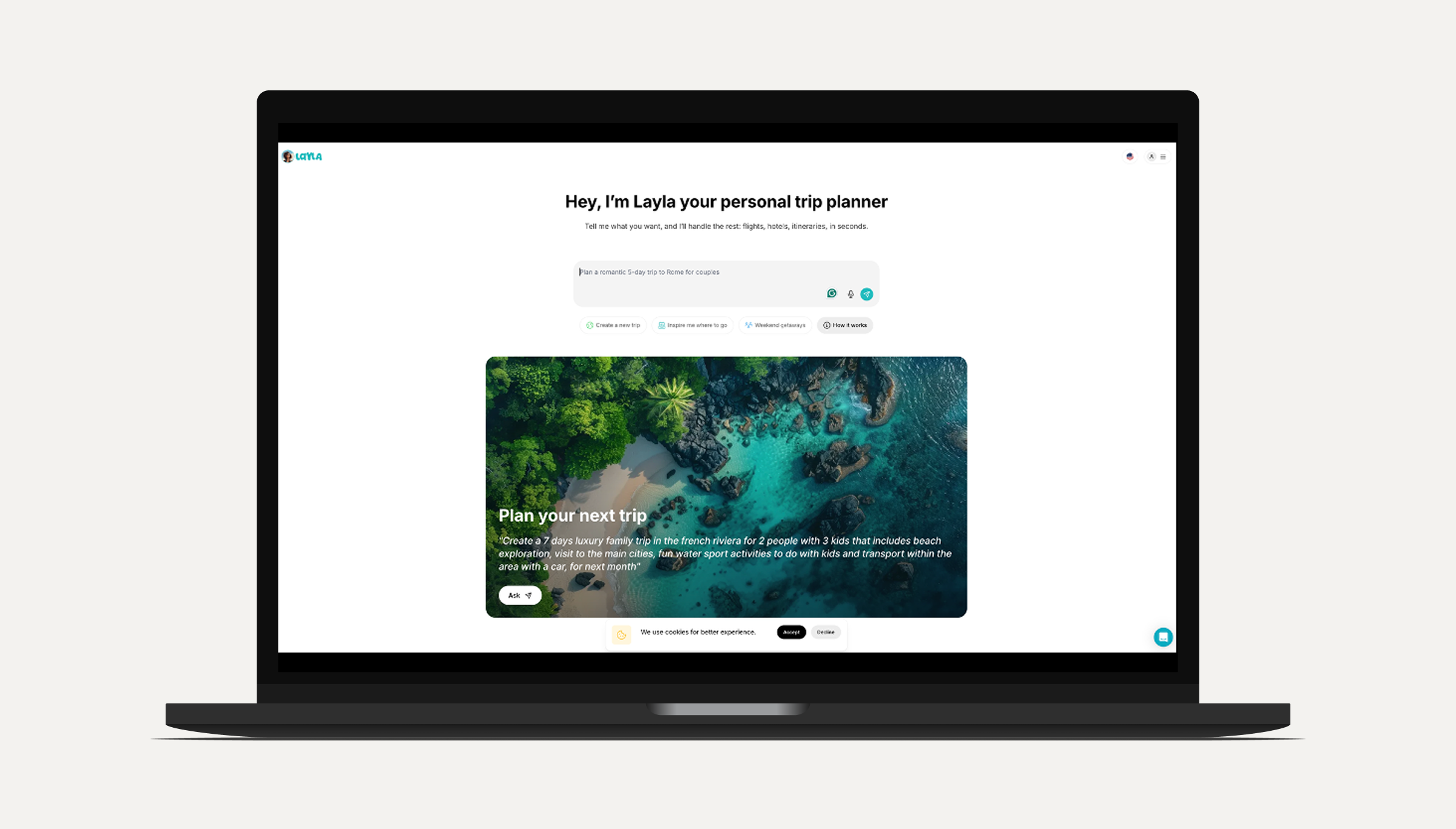
Or kayak’s kayak.ai
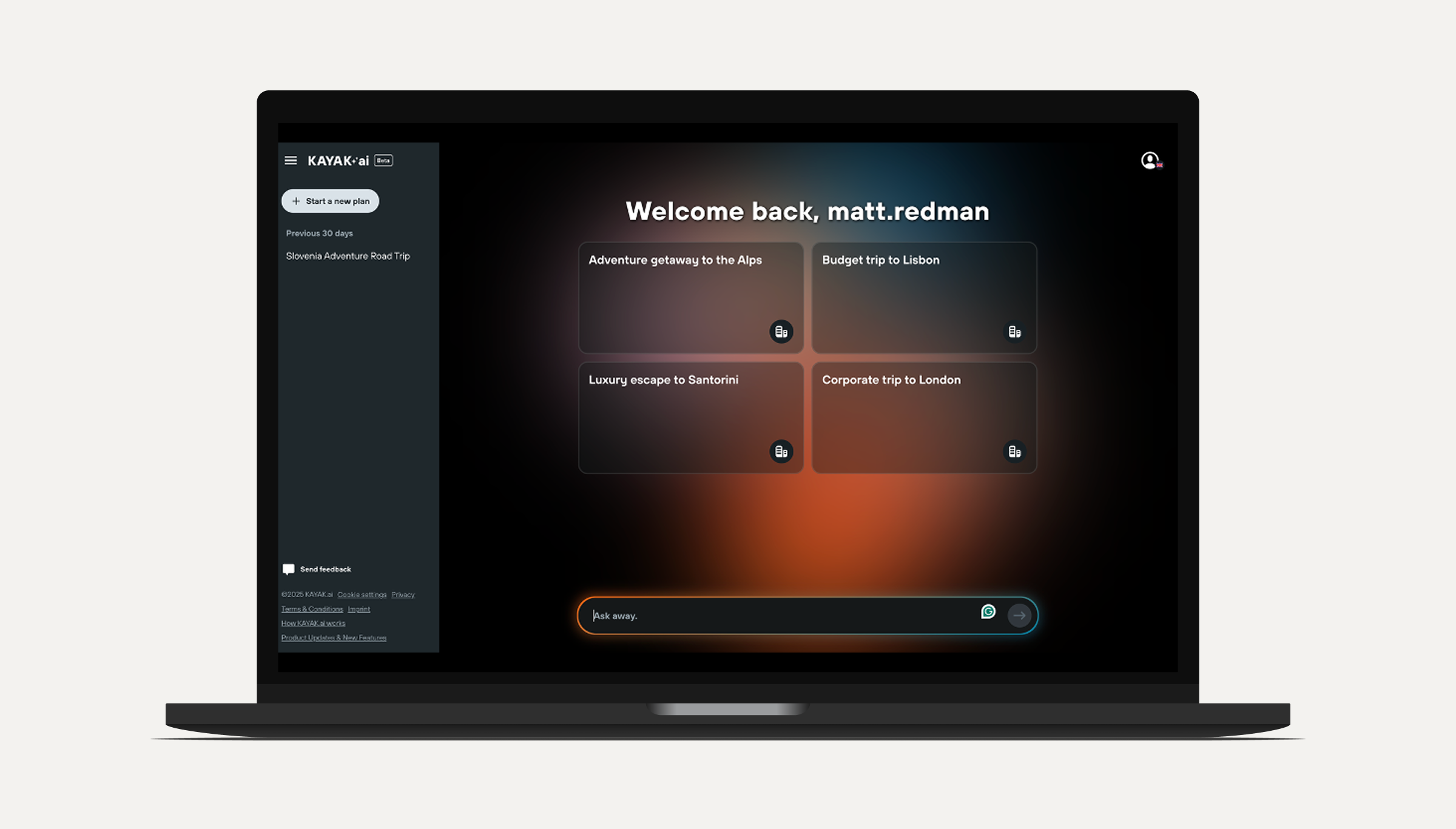
All the way to The Feelings Engine – helping you book based on what you want to feel.
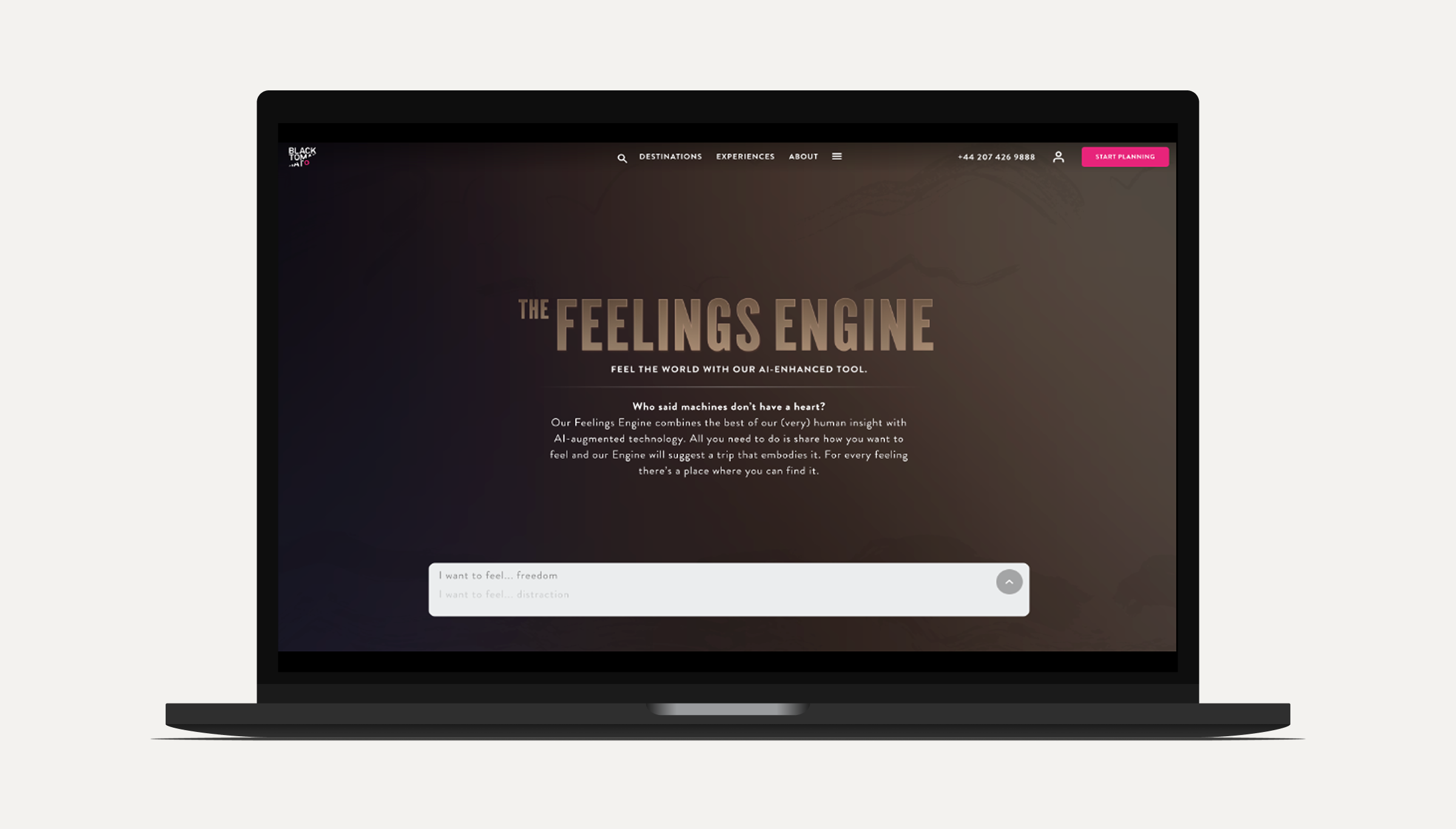
These tools do not just recommend. They can book, replan and reprice in real time. They perform tasks that human travel agents once did, but at a scale and speed an individual could not match. Maya, for instance, is an AI agent for travel companies that operates 24/7 in multiple languages, providing recommendations and selling services. Maya has demonstrated a 25% increase in leads and 2x more engagement within three months of implementation. Startups benefit from a lower barrier to entry — fewer engineers and lower server costs — allowing them to focus on consumer problems and enabling "solopreneurs" to generate income from day one.
Scaled innovation
Despite these advancements, the reach of AI tools is still niche. Early adopters and digital natives embrace them, but mainstream holidaymakers are not yet fully on board. The biggest travel companies are rethinking how to leverage existing technology and proprietary data to offer scaled innovations to the mainstream holidaymaker.
This shift is less about replacing core booking engines and more about creating intelligent, dynamic layers on top of existing infrastructure to foster conversational and emotionally resonant experiences.
Legacy infrastructure and fragmented systems
Enterprise companies are frequently hampered by outdated legacy platforms, fragmented inventories and risk-averse procurement cultures. Amadeus, for example, is noted as a legacy platform struggling to keep pace. Hotels often have tech that is hard to overhaul. Stitching AI into these tangled ecosystems is not trivial: a seamless AI travel agent requires interoperable data, dynamic pricing feeds and content standardization, all of which remain significant hurdles.
Data unification and a real-time layer
Major travel brands are hampered by fragmented inventories and siloed customer data. Solutions like Databricks’ Data Intelligence Platform use a lakehouse to unify and transform data in real time where it already resides, eliminating costly enterprise data migration. This creates a centralized intelligence layer supercharged with AI and LLMs. Connecting data points across the customer experience is crucial for better customer service.
Building knowledge layers
IT teams are integrating AI-driven knowledge assistants that ingest years of internal documentation — platform tickets, resolution documentation, API guides, runbooks and business workflows — to create a context-rich knowledge layer, accessible via natural language. This helps both human agents and AI systems access information quickly to support customer queries. The emphasis on documentation for AI to analyze is key and has been a huge benefit to large hotel networks.
Empowering the workforce
AI is not just about customer-facing tools. It also automates internal tasks, making human teams more efficient and freeing staff to focus on higher-value interactions and personal service — which is becoming a luxury. AI-powered managed services can lead to 30–40% reductions in platform support costs and faster resolution times. Conversational interfaces that sit on top of legacy systems or partnerships with startups (for example, Obvlo) can reduce pressure on human concierge and improve local experience listings.
Evolving API ecosystems to agent-to-agent communication
A seamless AI experience requires interoperable data and content standardization. The future envisions moving from APIs that speak to everyone to agents that speak to each other — a new layer of interoperability enabling highly specialized agents to communicate and act on a user's behalf across different systems. These systems serve APIs directly to AI models and agents while maintaining structured content repositories as raw material, not finished products.
The implicit role of data infrastructure
Natural language understanding, efficient retrieval of diverse data (documentation, user profiles, inventory details) and matching complex user preferences to products imply the use of robust data infrastructure. GPU-rich cloud platforms, scalable AI storage solutions, front-end frameworks, embedding pipelines, model routers and serving layers reduce friction and complexity in building with AI.
Trust and data privacy
Consumers remain hesitant to fully trust AI with sensitive information, particularly during booking. Data security and privacy are major concerns. Solutions are emerging where data is kept local and action logs / reasoning are transparent. Concepts like EU digital identity wallets aim to streamline identity verification securely across borders and services, enhancing trust.
While startups benefit from lower barriers to entry, established players have scale and vast amounts of data. Incumbents are leveraging AI to move quickly, transforming operations from maintenance to experience evolution and unlocking value from existing assets. The advantage for incumbents is their deep understanding of customer behaviour and rituals, though they continue to experiment to learn what customers truly want.
The paradox of planning: Why friction still matters
Efficiency-over-effectiveness created an epidemic of digital optimization that forgot the user — the guest — and obsessed instead about the race to revenue. Speed in this case meant reducing any friction that delayed a sale.
By ignoring the person, designers missed that there is a curious psychology to holiday planning: friction can be a feature, not a bug. Positive friction should be part of the design:
- Anticipation is part of the reward. The research phase — browsing, debating, dreaming — is an integral part of the holiday experience. People spend, on average, over 300 minutes planning travel, which is more time than a user spends purchasing a car.
- Spending justifies contemplation. Holidays often represent the most expensive discretionary spend of the year; customers want to feel the weight of their decision. Overly fast booking can feel careless.
- Control equals comfort. Many users are unwilling to relinquish full control to an AI. They desire guidance but not surrender. They want a co-pilot, not a captain. Travelers still highly value a personal touch from human agents when finalizing bookings, particularly when sharing payment details.
- Usage data: A 2024 Booking.com survey revealed that while over 70% of respondents were interested in using AI for trip planning, fewer than 25% had actually done so. Those who had mostly used AI for research rather than completing bookings without human input. Generative AI use among travellers has grown but remains experimental; travellers primarily use GenAI for inspiration rather than pragmatic booking decisions.
- Customers often express a contradictory stance: they desire less stress, but not zero friction. Lufthansa's research found a majority still preferred traditional booking methods; trust, especially around payments, remains a significant factor.
The middle ground: Co-creation, not automation
The future of AI in travel may not be fully autonomous agents but collaborative ones. In this model:
- AI handles the legwork — building multi-stop itineraries, surfacing unique stays and flagging visa issues — while allowing users to tweak, swap and override. AI enables hyper-personalization at scale.
- Brands can let customers dream with AI using generative tools that build mood boards, adapt based on emotion (e.g., “inspire me for a relaxing beach week”) and integrate friends’ suggestions, making planning feel like a conversation.
- Blending emotional and operational elements is key: AI should remove logistical pain while funding valuable human interaction moments, shifting attention back to human-to-human engagement.
- Highly specialized agents are expected to emerge, anchored by digital identity and autonomous agents. A digital wallet could store preferences, allergies and family details, allowing AI agents to act on the user's behalf and reduce friction at airports and hotels.
- Multimodal conversational experiences — combining voice, text, video and images — will enable interfaces to be highly reactive and hyper-personalized.
Beyond convenience, toward meaning
AI will fundamentally change how we plan and experience travel. But winners will not be those that automate the most steps. The best next-generation travel companies will respect that travel is a human endeavor: choosing where to go is an emotional journey, and anticipation and imagination matter. The companies that enhance the human experience rather than replace it will succeed. Memorable trips are often lived in the imagination long before the boarding pass is scanned.
In our next article in the series we follow these trends further into the customer journey and explore how travel companies increasingly have the ability and desire to become your always-on guide. What does the next-generation travel company look like when it can aggregate services into one place? What does this mean for the competitive landscape? And will consumers opt for the convenience of having everything in one place if it lets them curate a better travel experience?











